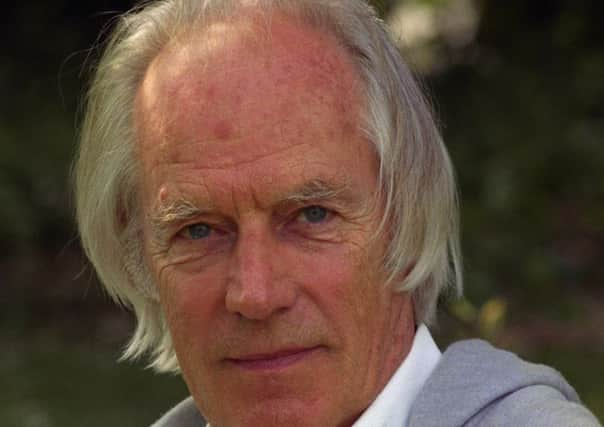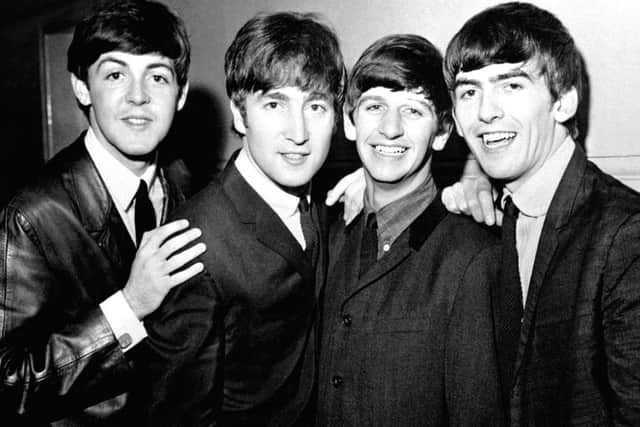Sir George Martin: The music man who helped make The Beatles fab


WHEN The Beatles arrived at the music studios in a plush corner of north west London on the morning of February 11, 1963, they had just experienced their first taste of fame.
The previous month their single Please Please Me had topped the charts thanks, in part, to a live performance of the song on the popular Saturday night TV show, Thank Your Lucky Stars, and their record company was eager to cash in on this success.
Advertisement
Hide AdAdvertisement
Hide AdDespite the fact that John Lennon was nursing a cold, which he fought off with a heady mix of tea, milk, cigarettes and throat lozenges, the band took less than 10 hours to record the 10 tracks that became their debut album, also titled Please Please Me, in Abbey Road’s Studio 2.


As with the hit single, the LP went to the top of the charts heralding the arrival of a rock ‘n’ roll band that would not only change the face of music but popular culture itself. The man at the helm, as he was for all but one of their subsequent studio albums, was George Martin - then head of Parlophone.
The acclaimed record producer, who has died aged 90, signed The Beatles after hearing their demo tape in 1962, taking them from their energetic mop-top recordings to the ground-breaking psychedelia of Sergeant Pepper.
A carpenter’s son from north London, Martin produced more than 700 records during a career that also saw him work with an array of artists including Dame Shirley Bassey, Sting, Cilla Black and Peter Sellers.
Advertisement
Hide AdAdvertisement
Hide AdBut it’s his collaboration with John, Paul, George and Ringo for which he will be remembered above all else.


Chris Charlesworth, a music writer and former editor of Omnibus Press who started his career in Yorkshire back in the 60s, says Martin will always be synonymous with The Beatles.
“I think one of his great achievements was to recognise that spark in them in the first place when other people had turned them down. He saw a spirit in The Beatles that he hadn’t seen in others, he liked the fact that they stood up for themselves. He was also sufficiently malleable as to not to try and mould them in his own image, he gave them free rein to experiment.”
This was at a time when Parlophone didn’t have a big reputation in the music business. “His Master’s Voice was EMI’s prestige record label for popular music, but until The Beatles came along Parlophone was seen as a bit of a dumping ground for oddballs and also-rans.”
Advertisement
Hide AdAdvertisement
Hide AdHe says that Martin resisted pressure from above to change the band’s format. “Back then the fashion was to have a lead singer and his band, you had Cliff Richard and the Shadows and Gerry and the Pacemakers and he was under pressure from his superiors to pick one of them as the band leader. But after listening to the demos he didn’t think that was right and he argued his case well, and it’s a good job that he did.”
Martin was a classically trained musician and Charlesworth says he was much more than that just a conventional record producer to The Beatles.
“He had to translate all their musical ideas. John Lennon would go to him wanting a sound like a barrel organ and he’d hum something and George Martin then had to explain this to the session musicians who came in to work with the band. It was the same with McCartney, he would whistle the trumpet solo idea for Penny Lane and George would turn it something more formal.”
Charlesworth says songs like Being for the Benefit of Mr Kite! and A Day in the Life bear the hallmarks of Martin’s musical influence. “I think his many achievements with The Beatles reached their highest point with Sgt Pepper. After that the band started fracturing a bit and he found himself stuck in the middle.”
Advertisement
Hide AdAdvertisement
Hide AdBarry Miles, author of Paul McCartney: Many Years From Now, the former Beatle’s authorised biography, knew Martin and spent time with band in the Abbey Road recording studios.
Speaking to The Yorkshire Post, he said it was hard to overstate Martin’s influence on the band. “He was extremely important to The Beatles. When they first went into the recording studio they didn’t even know how to use a microphone properly. Paul once told me, or maybe it was John, that he taught them to put the microphone higher than their mouth and to turn their head a bit to help them sound stronger.
“He taught them how to use the recording studio in the same way a teacher shows a pupil how to play an instrument. George was very much the patrician, he was also particularly good at suggesting something and making it seem like it was the band’s idea.”
This is backed up by Sir Paul McCartney himself who said when he first went to the producer with the basic idea for what became the song Yesterday, Martin used his trademark bedside manner to persuade him to try an idea that would help create one of the most famous songs of the last century.
Advertisement
Hide AdAdvertisement
Hide AdSir Paul had woken up one morning with a tune in his head and played it, accompanied only by a guitar, for his three bandmates as well as George Martin. The producer’s suggestion that they put a string quartet on the record was not welcomed at first, Sir Paul admitted, recalling his protestations that it might not be a good idea for a rock ‘n’ roll band.
“With the gentle bedside manner of a great producer he said to me, ‘let us try it and if it doesn’t work we won’t use it and we’ll go with your solo version,’” Sir Paul said. “I agreed to this and went round to his house the next day to work on the arrangement.
“He took my chords that I showed him and spread the notes out across the piano, putting the cello in the low octave and the first violin in a high octave and gave me my first lesson in how strings were voiced for a quartet.” Martin’s musical instincts had, not for the first time, proved right.
It was an example, too, of the close bond that existed between bandmates and producer. “They had a good working relationship and they were friends though they didn’t socialise much because they came from different backgrounds, he’d been through the war don’t forget,” says Miles.
Advertisement
Hide AdAdvertisement
Hide AdMartin was known for being good company and a great raconteur, but Miles says it was his humour that first endeared him to the band. “The fact that he’d worked with The Goons attracted them to him. He had this quirky, very English, sense of humour and he had this posh accent, which John used to take off.”
They were perhaps unlikely musical bedfellows but together they created something unique. “George contributed enormously and when you listen to their records you’re listening as much to George Martin’s sound as you are to the sound of The Beatles.”
He says you only have to listen to Let It Be, when the band opted to use Phil Spector as producer, to realise how pivotal Martin was to them. “The one time they didn’t use him it proved disastrous.” The album proved to be a fractious experience for the band members and Martin was back in charge for what proved to be their swansong, Abbey Road.
“He was a great producer, without question,” says Miles. “I would say there was as much a George Martin sound as there was a Motown sound, it was very open and unpretentious.”
Advertisement
Hide AdAdvertisement
Hide AdSo what would have happened if The Beatles and George Martin had never crossed paths? “It’s impossible to say what would have happened if the band hadn’t been signed by George, though they were such talented songwriters they would have probably emerged anyway. But George Martin helped make The Beatles and without him they would have sounded different - and probably not as good.”